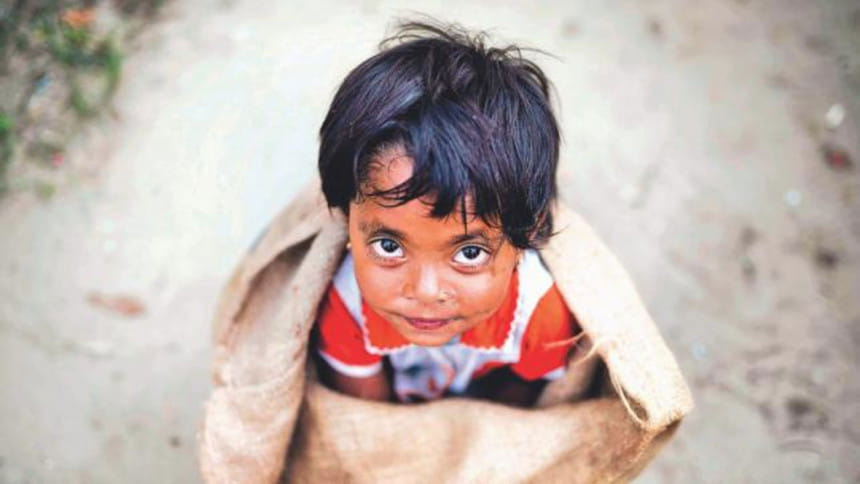Listen to children for a child-sensitive society

Today's children will be known as the "Covid Generation". Their health, nutrition, education, protection and overall wellbeing will be profoundly influenced by the impacts of the global pandemic. The next decade could see a huge reversal in children's rights or be a significant moment in the fight for a world where all children can grow up to realise their potential. It will depend on the decisions we make today. Are we willing to build back a better world for children? If yes, we have to make children a priority and they have to be part of mainstream development discourse and social conversations. Is that the case in Bangladesh? It does not seem so. Let me give an example.
Covid-19 has created stress for parents all over the world. They are struggling to manage work from home and look after their children. No one was used to this situation prior to the pandemic. In our society, we hear about this in general discussion, and the media also highlights this. However, are we recognising that children are also under a lot of stress? They are used to going to school, interacting with friends and being taught by teachers. Staying at home and receiving support from parents to continue some sort of education is now adding lot of pressure on them. Have we asked the children how they are during this global pandemic?
If we want to create a child sensitive society, it is important that we listen to children. According to Article 12 of the United Nations Convention on the Rights of the Child (UNCRC), children have a right to express their views on issues affecting their lives; the views of the child being given due weight in accordance with the age and maturity of the child. This includes decisions on regular activities, school environment and laws, policies related to health education, recreation and budgetary allocation. The National Child Policy 2011 of Bangladesh also emphasises the importance of listening to children. But did we consult children while taking the decision to keep schools closed for prolonged periods? Have we considered their interests, or is the decision convenient only for us—the adults? What will be our response if in future, the children affected today blame us for not making the effort to safely reopen schools? Will we be able to justify our lack of action?
"Children are the future of the nation" is a very popular statement in our society. But what are we doing to make children's "presents" more liveable and meaningful? Let us focus on the situation in urban areas. Affluence and extreme poverty coexist in urban settings in Bangladesh. Most children living in slums lack access to decent housing, clean water, sanitation, healthcare and quality education. In general, children are exposed to very high levels of air and noise pollution in our cities, and are unable to enjoy nature. Services including health, public transport, restaurants, museums etc are not child-friendly. There are very limited opportunities for sports and recreational and cultural activities, which leads to over-reliance on technology for communication and entertainment. Children are vulnerable to violence, abuse, exploitation and neglect. A sense of community is disappearing fast. The urban situation affects children's well-being; they are not able to grow in a holistic way.
The well-being of children is the ultimate indicator of a healthy habitat, a democratic society and good governance. A child-friendly city is the embodiment of the UNCRC at the local level: this means, in practice, that children's rights are reflected in policies, laws, programmes and budgets. In a child-friendly city, children are active agents; their voices and opinions are taken into consideration and influence decision-making processes.
From Tirana to Bogota, there are examples of how cities have taken initiatives that are conducive for their development. In Ciudad Bolivar (one of Bogota's poorest districts with high crime rates and little green space), community members have been working with Urban 95, a Bernard van Leer Foundation initiative to improve public spaces for people under 95cm tall (the average height of a three-year-old child). A community walk-around identified danger spots and how residents would like to tackle them.
The Bangladesh government should take initiatives in making cities child-friendly through a multi-sectoral approach. A few recommendations in this regard are—ensure that urban planning, infrastructure development, service delivery and broader efforts to reduce poverty and inequality meet the particular needs and priorities of children; listen to children and facilitate co-creative design of public spaces with them; consider child safety in infrastructure; bring back greenery in urban areas and prioritise children's play as well as creative activities; make streets and communities safe for children; develop the sensitivity and awareness of planners; and invest in child-inclusive urban planning.
In many well-respected museums in Europe, North America and Australia, children can read the description of some of the exhibits easily, as those are at their eye level and are written in a language that they understand. Restaurants serve food that they can eat, and give colouring pages as well as pencils, puzzles etc, so that they can spend time productively while waiting for food. There are play areas for children in public places. In most cases, these do not have much cost implications. Many examples could be given that show how it is possible to be child sensitive by considering things through children's lenses and by remembering that infrastructure and services will be used by children also, not only adults.
While the government remains responsible for developing the right legal and policy frameworks, allocating adequate budgets, capacity building of service providers and overall coordination of health, education and the protection of children; every segment of society should play its part. The media has a critical role to play in making governments accountable and raising public awareness on various issues related to children. Parents, teachers, doctors, nurses, planners, cultural activists, social workers etc have to understand how children of various age groups think and feel, and respond to their needs in a sensitive way.
Let us stop calling children the "future", listen to them, consider their best interests and perform our responsibilities to create a child-sensitive society.
Laila Khondkar is an international development worker.

 For all latest news, follow The Daily Star's Google News channel.
For all latest news, follow The Daily Star's Google News channel. 



Comments